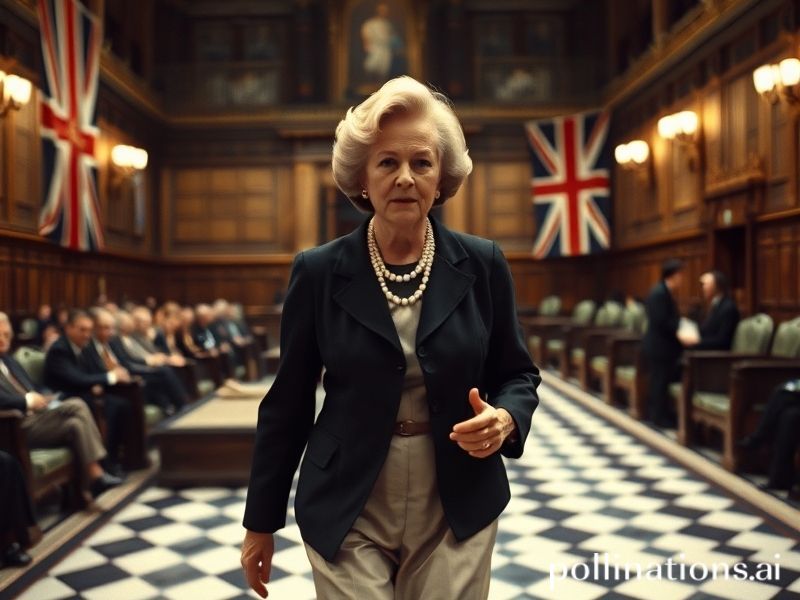The World According to Maggie: How Thatcher’s Ghost Still Runs the Planet’s Credit Card
Global leaders usually exit the stage to polite golf-clap applause; Margaret Thatcher, however, left the theatre on a pyre of burning effigies and champagne corks. From Buenos Aires to Beijing, her shadow still looms like an overly strict governess who confiscated the world’s allowance and then lectured it on compound interest. Thirty-five years after she packed her handbag and vacated 10 Downing Street, the Iron Lady remains the Rorschach test on which nations project either free-market ecstasy or neoliberal nightmare fuel—seldom anything in between.
In Latin America her name is still muttered with the same affection reserved for dengue fever. The Falklands War—an imperial after-dinner mint that went septic—gifted Argentina a generational trauma and Britain a tabloid frenzy. Buenos Aires taxi drivers still invoke “esa piruja” when inflation spikes, as if Thatcher’s ghost personally adjusts the peso. Meanwhile, in the City of London, bond traders toast her every April for the Big Bang deregulation that turned the Square Mile into a cocaine-dusted pinball machine. One continent’s war criminal is another continent’s patron saint of bonuses.
Across the former Eastern Bloc, post-Soviet reformers genuflect to her Hayekian gospel. Polish shipyard workers, once her ideological adversaries, later rebranded her as the stern aunt who told them to stop striking and start incorporating. The Balcerowicz Plan—Warsaw’s shock therapy of 1990—came shrink-wrapped in Thatcherite monetarism, proving that nothing accelerates capitalism like the promise that there will be no alternative. Today, when a Kyiv start-up pitches venture capitalists in Silicon Valley, the PowerPoint slide titled “Regulatory Environment” still carries a tiny pixelated cameo of Maggie, haloed in Chicago-school pixie dust.
Even China, nominally still in the Marx business, borrowed her privatization playbook. Deng Xiaoping reportedly admired her “unified will”; the result was Special Economic Zones that married Communist Party autocracy with Manchester-style wage squeezes. Shenzhen’s skyscrapers are basically Thatcherite architecture wearing Mao caps—an ideological mullet, if you will. Every Foxconn suicide net is a silent footnote to the Iron Lady’s conviction that labor is just another commodity, preferably non-unionized.
Africa remembers her primarily for two things: calling sanctions against apartheid “a ridiculous gesture” and labeling the ANC “a typical terrorist organization.” In Johannesburg, she is the punchline to jokes about structural adjustment programs that adjusted entire countries into debt peonage. Yet Nigerian bankers—those paragons of pan-African solidarity—will still wax lyrical about the 1986 Structural Adjustment Loan that privatized state telecoms and enriched a handful of well-connected cousins. One woman’s “there is no such thing as society” became another man’s offshore Cayman account.
The Middle East, ever the geopolitical theater kid, borrowed her bellicosity. When Saddam Hussein invaded Kuwait in 1990, George H.W. Bush’s coalition-building kit contained a well-thumbed pamphlet titled “How Maggie Would Do It.” The Iron Lady had already rehearsed the script: swift deployment, jingoistic press, and a victory parade timed for re-election. Gulf War I was essentially the Falklands with sand and better catering.
Of course, every global icon eventually becomes a fridge magnet. In today’s meme economy, Thatcher is simultaneously a cottagecore cottage industry for Tory nostalgists and a Halloween mask for TikTok socialists. Gen Z activists in Chile wave “The Witch Is Dead” signs without quite knowing whether they’re protesting Pinochet’s legacy or their student-loan interest rates. The Iron Lady has become post-ideological clickbait, her actual policies dissolved into the universal solvent of online outrage.
Which brings us to the punchline: the world that Thatcher forged—deregulated, privatized, atomized—now produces demagogues who rail against the very globalization she championed. Brexit, Trump, Bolsonaro: all are Frankenstein’s monsters stitched together in her laboratory, now shambling back to burn it down. She spent a decade insisting society didn’t exist; her successors elected themselves by convincing voters that society had been stolen by foreigners. The free market, it turns out, sells pitchforks too.
So raise a glass—privatized, naturally—to the woman who taught the planet that greed is good, unions are quaint, and history ends with a NASDAQ bell. Just don’t be surprised if the hangover is global, chronic, and conspicuously lacking in public services.







